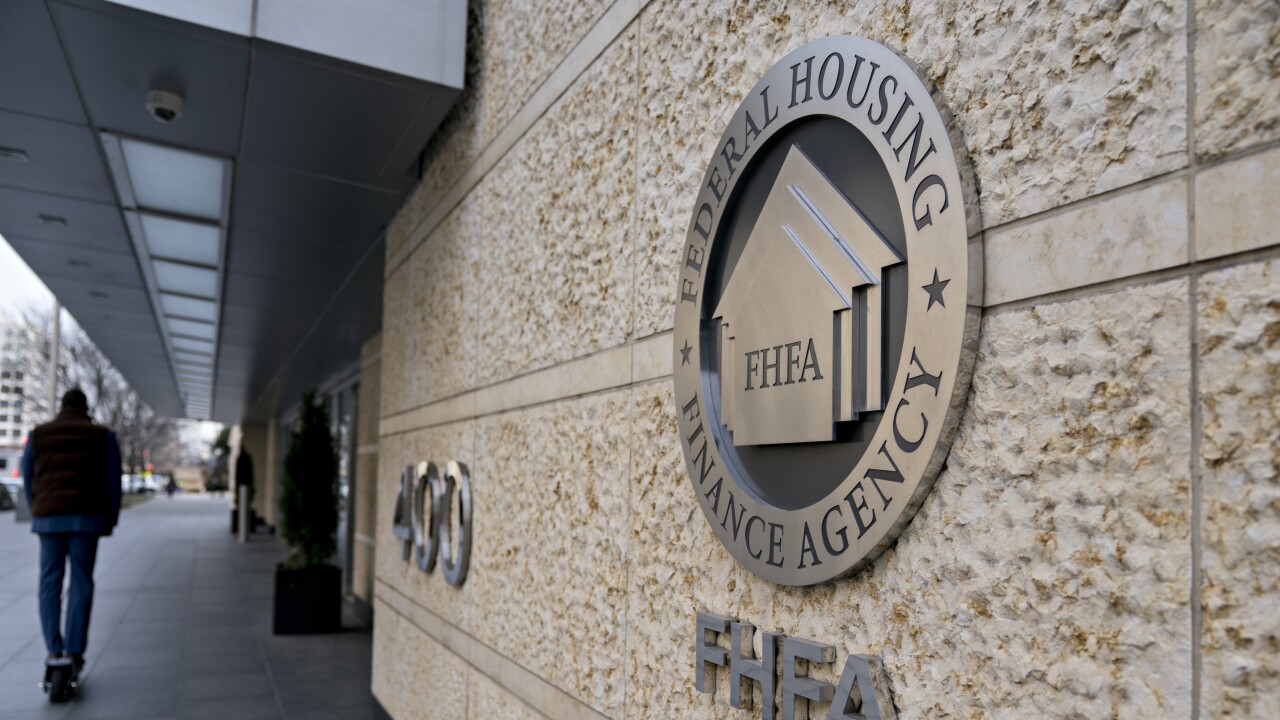Regulation and compliance
Regulation and compliance
-
As they prepare to exit government conservatorship, Fannie Mae and Freddie Mac have enlisted the investment banks to help them boost capital and evaluate market opportunities.
June 15 -
Evidence suggests some minority-owned businesses can’t access loans, and the Trump administration is under pressure to report borrower demographics. The issue is gaining attention against the backdrop of protests over the George Floyd killing.
June 14 -
A budget item establishing a new agency to protect consumers from predatory lenders has been put on hold as state officials deal with the coronavirus response and other priorities. But it could be revived in legislative talks later this summer.
June 11 -
Unlike in previous years, the results from two different evaluations will be released simultaneously and will include an assessment of bank capital under coronavirus-related scenarios.
June 9 -
The FHFA’s proposal is intended to strengthen Fannie Mae and Freddie Mac, but many experts warn that it could boost guarantee fees for lenders that they say may be passed on to borrowers.
June 8 -
One criticism of the CARES Act is that it provides relief only to borrowers with government-backed loans. Bills in New York and California would cover the remaining 30% of homeowners.
June 4 -
The new FHFA rule sets a percentage-based threshold to measure compliance, rather than Home Mortgage Disclosure Act data.
June 3 -
The FHFA looks to shed light on the amount of funds Fannie and Freddie will need to hold for their risk-sharing deals.
June 3 -
The firm also predicts that the coronavirus pandemic will delay the GSEs' release from government control.
June 3 -
The changes being sought would benefit both small businesses and banks, which would avoid the cost of servicing many low-yielding loans.
June 2 -
Periods of significant loan defaults are tough on banks and force unpleasant choices. Here are steps to evaluate collateral in such uncertain times.
June 1 -
The Federal Reserve set up a liquidity facility to help banks meet demand for emergency small-business loans through the Paycheck Protection Program, but it's gone largely unused.
June 1 -
The new regulation is intended as a workaround for banks affected by the 2015 decision that created legal uncertainty for loans sold across state lines.
May 29 -
The general structure of this year’s reviews is unchanged despite the pandemic. But a supplemental analysis of banks' response to the downturn could weigh heavily in evaluating 2020 capital distributions and making adjustments to the tests over the long run.
May 28 -
The congressional showdown over the pace of rulemaking during the pandemic is a hardening of older positions on banking policy ahead of the 2020 elections, observers said.
May 27 -
The economic contraction caused by the coronavirus pandemic has been worse than the Wall Street firm had modeled two months ago, its president John Waldron said Wednesday.
May 27 -
Some observers wonder if proposed regulatory targets for Fannie Mae and Freddie Mac will stoke concerns about low shareholder returns. But others suggest those fears are unfounded.
May 25 -
The templates are meant to make it easier to obtain agency approval for small-dollar loan products and to accommodate mortgage servicers that want to provide online loss mitigation options.
May 22 -
The much-anticipated proposal, which would not go into effect until after Fannie Mae and Freddie Mac are privatized, reflects Director Mark Calabria’s aggressive efforts to get the companies on a strong financial footing.
May 20 -
Director Mark Calabria, who abandoned the Fannie and Freddie capital proposal written by his predecessor, said he expects a revised framework to be ready “very soon.”
May 19



















